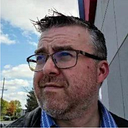Member-only story
Criminology, Journalism, and Concussion: About Me, Aaron Jacklin
Post-concussion syndrome ended my journalism career.* For a while, that’s eclipsed everything else, but I’m trying to change that.
I’m also a dad, a writer, an editor, and an amateur coder. I’ve worked in nonprofit news and as a criminological research assistant. I’ve done other things too, but most of that wasn’t as interesting.
* At least, my first journalism career.
Criminology
It’s difficult to pin down one single influence that brought me to criminology, though the biggest is undoubtably that I knew many crime victims and their family members.
I also grew up in a hunting family, which sensitized me to the gun control issue. As a teenager in the late 1990s, I read Mindhunter: Inside the FBI’s Elite Serial Crime Unit, and it, along with other books by FBI profilers, introduced me to the idea that crime was studied in structured ways.
Perhaps oddly, a martial arts background also played a factor. I earned a first degree black belt and taught in the dojo while I was in high school. Knowing many crime victims, as I mentioned above, I had a special interest in teaching self defense.
Finally, I was profoundly affected by the news coverage of the World Trade Center bombing…
